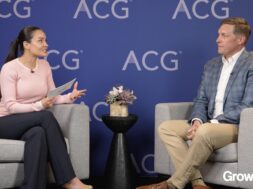Middle-Market Public Policy Roundup
The SEC announced members of its Small Business Capital Formation Committee and an upcoming roundtable, Trump met with Democrats on infrastructure and opportunity zones drew new concerns.

Over the last week, the SEC released the names of inaugural members of the Small Business Capital Formation Advisory Committee and an upcoming roundtable to kick off National Small Business Week. On Tuesday, President Trump met with congressional Democrats to discuss a new infrastructure package, an issue with wide bi-partisan support that could benefit private capital providers and the middle market. Finally, in the continuing onslaught of developments surrounding opportunity zones, Democratic lawmakers sent a letter to several of the agencies responsible for the program, asking what steps can be taken to prevent gentrification in the communities many of them represent.
SEC Announces Members of Small Business Capital Formation Committee and Upcoming Roundtable
A string of announcements came from the SEC over the past week, the first being the members of the Small Business Capital Formation Advisory Committee and a roundtable that will be hosted by the Office for the Advocate of Small Business Capital Formation on May 6, at the start of National Small Business Week.
The Office of the Advocate for Small Business Capital Formation was established in the SEC Small Business Advocate Act of 2016 and began operations in January. The office was created, according to the SEC, in order to advocate for small businesses and their investors by “conducting outreach to solicit views on relevant capital formation issues, providing assistance to resolve significant problems, analyzing the potential small business impact of proposed regulations and rules, and recommending changes to mitigate capital formation issues and promote the interests of small businesses and their investors.”
In addition to creating the Office of the Advocate, the legislation also required that an advisory committee be established to focus on issues affecting capital formation for privately held small businesses and publicly traded companies, which it defines as those with less than $250 million in public market capitalization. According to PitchBook, there are over 1,000 middle-market ($10 million-$1 billion in EBITDA), publicly-traded companies which meet these criteria.
The advisory committee consists of a diverse set of lawyers, accountants, investors and business owners from companies across the United States. The full list can be found in the press release. The committee will hold its first meeting from 1 p.m. to 3:30 p.m. ET on May 6.
The related roundtable event being held the same day at the SEC’s Washington, D.C. offices will “feature discussions between small businesses and venture capital investors on the successes and challenges they have experienced in raising capital and investing outside of the more traditional financing ‘hot spots’ along the U.S. coasts,” according to the SEC’s press release.
Trump Talks Infrastructure with Congressional Democrats
Top Democrats in Congress met with President Trump on April 30 to kick off talks about a potential infrastructure deal. House Speaker Nancy Pelosi, D-Calif., and Senate Minority Leader Chuck Schumer, D-N.Y., said they came to an agreement with the president on a $2 trillion target for an overhaul of U.S. infrastructure.
Both parties agreed to meet in three weeks to discuss next steps, including how to pay for such a package–an area wrought with partisan divisiveness. A multitude of “pay-fors” have been floated by different policymakers with little agreement, even within the same party. Powerful and diverse lobbying groups, such as the U.S. Chamber of Commerce and the AFL-CIO, agree on the diagnosis of an infrastructure overhaul but disagree on the prescription.
Room for private capital?
Private equity funds have been raising increasing amounts of capital for infrastructure funds in recent years, with Blackstone announcing in 2017 a $40 billion-dollar fund aiming to utilize debt-financing to invest $100 billion in primarily U.S.-based infrastructure projects. This may be just the beginning, as infrastructure deals represent inherently stable, steady investments that are less subject to economic headwinds.
The ability for private capital to participate in a large-scale infrastructure overhaul would largely depend on the specifics of the deal reached by both parties and President Trump. Traditionally, Democrats have advocated for more direct financing by the government, while Republicans have advocated for increased private sector participation through methods, such as public-private partnerships. Chairman of the House Transportation and Infrastructure Committee Peter DeFazio, D-Ore., who was present at the Oval Office meeting, largely dismissed Democratic “campaign” ideas, such as repealing portions of the 2017 tax cuts and also stated that President Trump isn’t a fan of public-private partnerships. Instead, he expects a combination of bonds, user fees and other revenue-raisers.
What’s in it for the middle market?
According to the National Center for the Middle Market’s 2015 Middle Market Indicator (summarized by the U.S. Chamber of Commerce here), 9 out of 10 middle-market executives want to see U.S. infrastructure improved. More than 80% of those executives surveyed say their companies are significantly impacted by infrastructure and 1 out of 10 executives of middle-market businesses say that America’s infrastructure needs immediate action. Almost half of company leaders said they are willing to take a hit to their taxes for that to happen.
Democratic Lawmakers Express Worries About OZ’s Impacts on Low-Income Residents
In letters sent to the Treasury, IRS and the Office of Management and Budget, 11 members of the Congressional Black Caucus expressed concerns that, without the proper safeguards, the federal opportunity zones program could lead to rapid gentrification and hurt low-income residents.
The letter expresses many of the reservations some Democratic lawmakers have raised about the program, which was originated as a bipartisan effort between Sens. Cory Booker, D-N.J., and Tim Scott, R-S.C. The original bill had certain data tracking requirements that were not included in the final legislation, but Booker and Scott are planning to reintroduce them in a standalone bill.
The lawmakers responsible for the letter asked the agencies what they intend to do to prevent gentrification and ensure positive economic outcomes for residents in opportunity zones, whether there would be tenant affordability requirements placed on real estate investments funded by qualified opportunity funds and if there would be oversight to ensure prevention of corruption and overinvestment in already-thriving areas. Additionally, they expressed concern surrounding anti-abuse provisions and questioned how investors would be prevented from using opportunity zones as a tax haven.
While there is a lot of enthusiasm around the intended benefits of the opportunity zone program, the letter shows potential problems the initiative could face in the Democrat-controlled House of Representatives.
Are you an ACG member who enjoys reading the public policy roundup? Join our Public Policy Interest Group to receive even more in-depth coverage of federal policy activity impacting the middle market, as well as opportunities to help shape ACG’s advocacy efforts.

Maria Wolvin is ACG Global’s vice president and senior counsel, public policy.

Ben Marsico is ACG Global’s manager of legislative and regulatory affairs.


